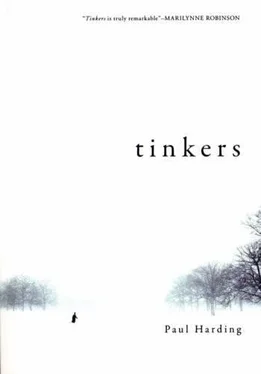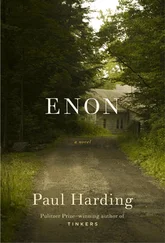I decided to try to find my father in the woods. When I walked through the woods, I wore my father's old boots. They were too large, so I had to put on three pairs of socks to make them snug. I carried my lunch in his old wicker creel, slung over my shoulder. I wore his widebrimmed hat. When I walked through the Gaspars' corn patch, I imagined breaking an ear from its stalk, peeling its husk, and finding my father's teeth lining the cob. They were clean and white, but worn like his. Strands of my father's hair encased the teeth instead of corn silk. As I hiked through the woods, I imagined peeling the bark from a birch tree, the outer layers supple, like skin. I would peel until I came to the wood. I would insert the tip of my knife into the wood and force the blade deeper until it touched something hard. I would cut a seam in the wood, prying it open an inch at a time, and find a long bone encased in the middle of the trunk. I imagined pulling flat rocks up from creek beds. I imagined climbing trees and tasting for traces of my father in their sap. This is how I thought of myself, as looking for what he had always called in his sermons the deep and secret yes, an idea I never knew whether was his own or something he had read in his books. I roamed the different places that we had gone together, but soon found myself hiking toward the outlet of Tagg Pond.
Spring rain made temporary ponds of the deep ruts along the abandoned tote roads. The water was shin-deep and the color of iron cream. Howard had to walk through one sometimes because it extended across the width of the entire road and into the woods. As he waded through, his feet pushed up milky, rust-colored clouds of mud from the bottom, out of which spurted schools of bright green tadpoles disturbed in their rapid and fragile evolutions. The tom-tom tap of a pileated woodpecker sounded from somewhere in the woods, to Howard's left. He thought of leaving the road to find it but decided not to. Grass covered the raised spine of the road where it was not sub merged in the metallic water. Howard walked along this narrow path. The road originally had been more or less straight, but, once abandoned, the woods had shifted it over the years, canting lengths of it to the left or right, skewing it and encircling it above, so that walking down it was like walking through a tunnel. Light filtered down from the sky in various amounts. The branches of maples and oaks and birch leaned across the road toward one another and intertwined and became nearly indistinguishable, their leaves mixed up, apparently sharing common branches, as if, after so many mingled seasons, the trees had grafted into one another and become a single plant that produced the leaves of several species. The light was trapped above Howard's head, glittering and abundant. Very few drops of it made their way through the tangle and into the grass. Howard twice passed places where the light gushed down and pooled over the ground-once where a giant blighted oak tree stood and then farther on, where lightning had split a huge spruce.
What looked like the end of the road was, in fact, merely a shift to the left or the right or a dip or gradual rise. And the way the clouds moved, mostly invisible, above the canopy of trees, now revealing the full light of the sun, now obscuring it, now diffusing it, reflecting it, and the way it sparkled and trickled and gushed and flooded and spun, and the way the wind dispersed it even more among the flickering leaves and twitching grass, all combined to make Howard feel as if he were walking through a kaleidoscope. It was as if the sky and the ground were turning end over end in front of him, around in a circle, so that the earth, as it swung up over the sky, dropped leaves and spears of grass and wildflowers and tree branches into the blueness and, as it rolled back down toward its proper place, in turn, received a precipitation of clouds and light and wind and sun from the sky. Sky and earth were now where they belonged, now side by side, now inverted, and now righted again in one seamless, silent spinning. Heedless animals picked their way through this turning thicket; birds and dragonflies dropped onto twigs and took off again for the skies; foxes padded over clouds and stepped back onto the forest floor without a pause; and a million tadpole tails flickered down from the watery ceiling and then sank back to their muddy nests. The light, too, shattered like a vast plate and rejoined itself and splintered again, shards and chips and glowing glass and backlit wisps of it turning in hushed and peaceful exchange and saturating everything Howard saw, so that all things themselves finally seemed to dissolve away and their shapes be held by nothing more than quills of colored light.
Howard eventually comes to the outlet at Tagg Pond. The day is unusually warm. He stoops to examine how the water has arranged silt and leaves around the stones in the pools beyond the first reaches of the outlet. The silt and water combine in an element that is half earth and half liquid. The appearance is that of a solid streambed. Howard takes off his father's boots and the three pairs of socks he is wearing and rolls up the legs of his pants. When he steps into the water, the mud yields, a phantom floor that gives way to the true ground with little more resistance than the water flowing over it. Howard's legs stir the silt into clouds, so he stands still for a time, watching a pair of cedar waxwings catch insects over the water and return to the same branch on a juniper bush growing on a hump of grass in the middle of the pool. The clouds of silt unfurl and the current carries them away. Then the water in which he stands is clear again and his legs look as if they end at the knees. The sunken halves of his legs stand buried in the silt among hidden branches and stones, which, because they are invisible, feel somehow like bones. After a time, small brook trout return to where he stands near the high grass and bushes of the bank. Clusters of frog eggs float past him, some close enough to see the embryos inside. Howard traces the riverbed with his feet and finds a flat stone broad enough to sit on. He finds another stone to place in his lap, so that the water will not lift him. He sinks down into the silt and sits on the flat stone. The silt is so deep where the stone is that only his head rises above the water and only his neck rises above the silt. He watches the silt billow away from his neck, as if his severed head has been tossed on the water and, rather than blood, bleeds clouds of soil.
It is now the middle of the afternoon and Howard decides to sit this way through the entire night, until the sun rises the next morning. By the time the shadows begin to lengthen and creep across the water, the stream has healed itself back around him and he imagines that he will now be able to see the animals and the light and the water the way they are when he is not present, and that that might tell him something about his father. I will have to sit still, like a guru, he thinks. I will have to ignore cramps and the cold. I have to breathe very slowly and very quietly, so that my breath does not even stir the water flowing past my chin. I have to ignore whatever slithers past me in the mud. I cannot fall asleep. I am bound to see frightening things. What if I see lights in the sky? What if I see shadows sprinting through the tops of the trees? What if I see wolves walk on two feet and crouch like men to drink from the stream? What if there is a storm? What if it is clear and the sky brimming so full of stars that the light overflows down onto the earth and transforms into luminescent white flowers along the bank, which sparkle and disperse without a trace the moment the planet passes the deepest meridian of night and begins turning back toward the sun? What if I see my father, just inside the trees, humming softly to himself, content and at peace until he notices me sitting in the mud?
Читать дальше












